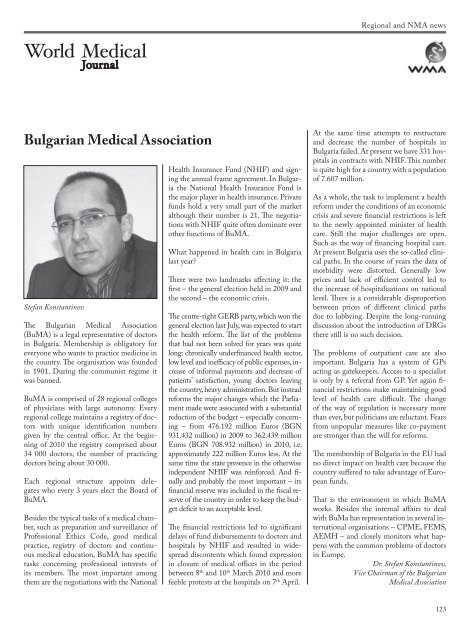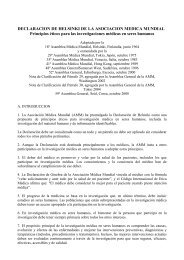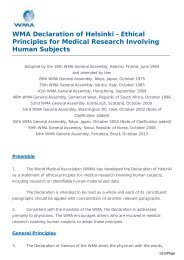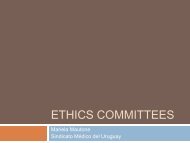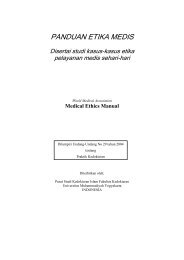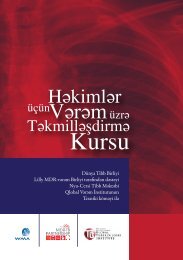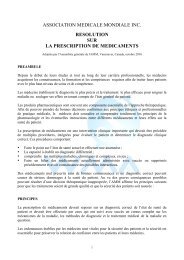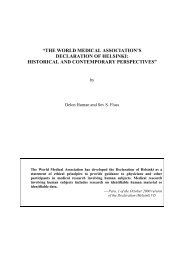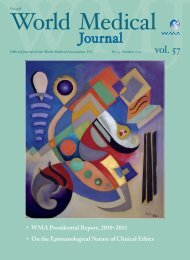WMJ 03 2010 - World Medical Association
WMJ 03 2010 - World Medical Association
WMJ 03 2010 - World Medical Association
- No tags were found...
Create successful ePaper yourself
Turn your PDF publications into a flip-book with our unique Google optimized e-Paper software.
Regional and NMA news<br />
Bulgarian <strong>Medical</strong> <strong>Association</strong><br />
Stefan Konstantinov<br />
The Bulgarian <strong>Medical</strong> <strong>Association</strong><br />
(BuMA) is a legal representative of doctors<br />
in Bulgaria. Membership is obligatory for<br />
everyone who wants to practice medicine in<br />
the country. The organisation was founded<br />
in 1901. During the communist regime it<br />
was banned.<br />
BuMA is comprised of 28 regional colleges<br />
of physicians with large autonomy. Every<br />
regional college maintains a registry of doctors<br />
with unique identification numbers<br />
given by the central office. At the beginning<br />
of <strong>2010</strong> the registry comprised about<br />
34 000 doctors, the number of practicing<br />
doctors being about 30 000.<br />
Each regional structure appoints delegates<br />
who every 3 years elect the Board of<br />
BuMA.<br />
Besides the typical tasks of a medical chamber,<br />
such as preparation and surveillance of<br />
Professional Ethics Code, good medical<br />
practice, registry of doctors and continuous<br />
medical education, BuMA has specific<br />
tasks concerning professional interests of<br />
its members. The most important among<br />
them are the negotiations with the National<br />
Health Insurance Fund (NHIF) and signing<br />
the annual frame agreement. In Bulgaria<br />
the National Health Insurance Fund is<br />
the major player in health insurance. Private<br />
funds hold a very small part of the market<br />
although their number is 21. The negotiations<br />
with NHIF quite often dominate over<br />
other functions of BuMA.<br />
What happened in health care in Bulgaria<br />
last year<br />
There were two landmarks affecting it: the<br />
first – the general election held in 2009 and<br />
the second – the economic crisis.<br />
The centre-right GERB party, which won the<br />
general election last July, was expected to start<br />
the health reform. The list of the problems<br />
that had not been solved for years was quite<br />
long: chronically underfinanced health sector,<br />
low level and inefficacy of public expenses, increase<br />
of informal payments and decrease of<br />
patients’ satisfaction, young doctors leaving<br />
the country, heavy administration. But instead<br />
reforms the major changes which the Parliament<br />
made were associated with a substantial<br />
reduction of the budget – especially concerning<br />
– from 476.192 million Euros (BGN<br />
931.432 million) in 2009 to 362.439 million<br />
Euros (BGN 708.932 million) in <strong>2010</strong>, i.e.<br />
approximately 222 million Euros less. At the<br />
same time the state presence in the otherwise<br />
independent NHIF was reinforced. And finally<br />
and probably the most important – its<br />
financial reserve was included in the fiscal reserve<br />
of the country in order to keep the budget<br />
deficit to an acceptable level.<br />
The financial restrictions led to significant<br />
delays of fund disbursements to doctors and<br />
hospitals by NHIF and resulted in widespread<br />
discontents which found expression<br />
in closure of medical offices in the period<br />
between 8 th and 10 th March <strong>2010</strong> and more<br />
feeble protests at the hospitals on 7 th April.<br />
At the same time attempts to restructure<br />
and decrease the number of hospitals in<br />
Bulgaria failed. At present we have 331 hospitals<br />
in contracts with NHIF. This number<br />
is quite high for a country with a population<br />
of 7.607 million.<br />
As a whole, the task to implement a health<br />
reform under the conditions of an economic<br />
crisis and severe financial restrictions is left<br />
to the newly appointed minister of health<br />
care. Still the major challenges are open.<br />
Such as the way of financing hospital care.<br />
At present Bulgaria uses the so-called clinical<br />
paths. In the course of years the data of<br />
morbidity were distorted. Generally low<br />
prices and lack of efficient control led to<br />
the increase of hospitalisations on national<br />
level. There is a considerable disproportion<br />
between prices of different clinical paths<br />
due to lobbying. Despite the long-running<br />
discussion about the introduction of DRGs<br />
there still is no such decision.<br />
The problems of outpatient care are also<br />
important. Bulgaria has a system of GPs<br />
acting as gatekeepers. Access to a specialist<br />
is only by a referral from GP. Yet again financial<br />
restrictions make maintaining good<br />
level of health care difficult. The change<br />
of the way of regulation is necessary more<br />
than ever, but politicians are reluctant. Fears<br />
from unpopular measures like co-payment<br />
are stronger than the will for reforms.<br />
The membership of Bulgaria in the EU had<br />
no direct impact on health care because the<br />
country suffered to take advantage of European<br />
funds.<br />
That is the environment in which BuMA<br />
works. Besides the internal affairs to deal<br />
with BuMa has representation in several international<br />
organisations – CPME, FEMS,<br />
AEMH – and closely monitors what happens<br />
with the common problems of doctors<br />
in Europe.<br />
Dr. Stefan Konstantinov,<br />
Vice Chairman of the Bulgarian<br />
<strong>Medical</strong> <strong>Association</strong><br />
123


